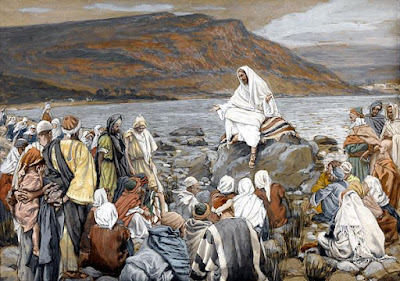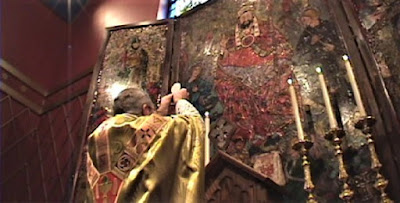Saint David, or Dewi Sant, as he is known in the Welsh language, is the patron saint of Wales. He was a Celtic monk, abbot and bishop, who lived in the sixth century. During his life, he was the archbishop of Wales, and he was one of many early saints who helped to spread Christianity among the pagan Celtic tribes of western Britain.
For details of the life of Dewi, we depend mainly on his biographer, Rhigyfarch. He wrote Buchedd Dewi (the life of David) in the 11th century. Dewi died in the sixth century, so nearly five hundred years elapsed between his death and the first manuscripts recording his life. As a result, it isn't clear how much of the history of Dewi's life is legend rather than fact.
However, sources tell us that Dewi was a very gentle person who lived a frugal life. It is claimed that he ate mostly bread and herbs - probably watercress, which was widely used at the time. Despite this supposedly meager diet, it is reported that he was tall and physically strong.
Dewi is said to have been of royal lineage. His father, Sant, was the son of Ceredig, who was prince of Ceredigion, a region in South-West Wales. His mother, Non, was the daughter of a local chieftain. Legend has it that Non was also a niece of King Arthur.
Dewi was born near Capel Non (Non's chapel) on the South-West Wales coast near the present city of Saint David. We know a little about his early life. He was educated in a monastery called Hen Fynyw, his teacher being Paulinus, a blind monk. Dewi stayed there for some years before going forth with a party of followers on his missionary travels.
Dewi travelled far on his missionary journeys through Wales, where he established several churches. He also travelled to the south and west of England and Cornwall as well as Brittany. It is also possible that he visited Ireland. Two friends of his, Saints Padarn and Teilo, are said to have often accompanied him on his journeys, and they once went together on a pilgrimage to Jerusalem to meet the Patriarch.
Dewi is sometimes known, in Welsh, as 'Dewi Ddyfrwr' (David the Water Drinker) and, indeed, water was an important part of his life. He is said to have drunk nothing else. Sometimes, as a self-imposed penance, he would stand up to his neck in a lake of cold water, reciting Scripture.
He founded a monastery at Glyn Rhosyn (Rose Vale) on the banks of the small river Alun where the cathedral city of St. David stands today. They had to get up very early in the morning for prayers and afterwards work very hard to help maintain life at the monastery, cultivating the land and even pulling the plough. Many crafts were followed, and beekeeping, in particular, was very important. The monks had to keep themselves fed as well as the many pilgrims and travelers who needed lodgings. They also had to feed and clothe the poor and needy in their neighborhood.
There are many stories regarding Dewi's life. It is said that he once raised a youth from death, and milestones during his life were marked by the appearance of springs of water. These events are arguably more apocryphal than factual, but are very well known to Welsh-speaking schoolchildren.
Perhaps the most well-known story regarding Dewi's life is said to have taken place at the Synod of Llanddewi Brefi. They were to decide whether Dewi was to be archbishop. A great crowd gathered at the synod, and when Dewi stood up to speak, one of the congregation shouted, 'We won't be able to see or hear him'. At that instant the ground rose till everyone could see and hear Dewi. Unsurprisingly, it was decided, very shortly afterwards, that Dewi would be the archbishop.
It is claimed that Dewi lived for over 100 years, and it is generally accepted that he died in 589. His last words to his followers were in a sermon on the previous Sunday. Rhigyfarch transcribes these as 'Be joyful, and keep your faith and your creed. Do the little things that you have seen me do and heard about. I will walk the path that our fathers have trod before us.'
“Do the little things” (“Gwnewch y pethau bychain”) is today a very well-known phrase in Welsh, and has proved an inspiration to many. On a Tuesday, the first of March, in the year 589, the monastery is said to have been 'filled with angels as Christ received his soul'.
Dewi's body was buried in the grounds of his own monastery, where the Cathedral of St. David now stands. After his death, his influence spread far and wide - first through Britain, along what was left of the Roman roads, and by sea to Cornwall and Brittany.
For those who might like to celebrate St. David’s Day with an authentic comestible, here is the recipe for cawl, which is the dish most commonly served for dinner on the farm during the winter months in the counties of South and West Wales. The broth would be served in basins or bowls, with bread, and the meat and vegetables served as a second course.
2 lb Best end of neck Welsh Lamb
1/2 lb Carrots
2 large Leeks
1/2 oz Flour
1 small Swede or Turnip
1 lb Potatoes
1 oz parsley
Salt and Pepper
Put the meat into the saucepan, cover with cold water, add salt and pepper, bring slowly to the boil and skin carefully. (This can be done beforehand, and the fat allowed to set on the surface. This makes it easier to skim off). Then add the carrots (cut in half), the swede (sliced) and the white of the leeks, and simmer gently for two to two-and-a-half hours. Add the potatoes (cut in flour) and continue to simmer for another 30 minutes. When the potatoes are almost cooked, thicken with flour and a little water. Lastly add the green of the leeks and parsley (chopped) and simmer for another 10 minutes and serve in basins while hot.
During Lent, this recipe for Caws Pobi (Welsh rarebit, also known as Welsh Rabbit, although it has nothing to do with rabbits) makes a great Friday night supper.
6 ounces strong Cheddar cheese;
1 tablespoon butter;
1-2 teaspoons Worcester sauce (to taste);
1 level teaspoon dry mustard;
2 teaspoons flour or cornflour;
4 tablespoons beer (about);
4 slices bread toasted on one side.
Put cheese, mustard, Worcester Sauce, butter and flour into saucepan and mix well, moisten with beer, but don't make too wet. Stir over gently heat until all is melted and become a thickish paste. Allow to cool a little while you make the toast. Spread mixture on untoasted side and put under hot grill until bubbling.
And finally, for something deliciously sweet and authentically Welsh, try some wonderful Bara Brith (Welsh fruitcake):
1 lb (450g) mixed dried fruit, such as raisins and currants
1 pint (300ml) tea
2 tbsp marmalade
1 egg, beaten
6 tbsp soft brown sugar
1 tsp mixed spice
1 lb (450g) self raising flour
honey to glaze
Soak the fruit overnight in the tea. Next day, mix in the marmalade, egg, sugar, spice and flour. Spoon mixture into a greased 2 lb (900g) loaf tin and bake in a warm oven 325°F, 170°C for 1 hour or until the center is cooked through. Check from time to time to see that the top does not brown too much, and cover with a sheet of foil or move down a shelf in the oven if necessary. Once cooked, leave the Bara Brith to stand for 5 minutes then turn out of the tin on to a cooling tray. Using a pastry brush, glaze the top with honey. Served sliced with salted butter and some tasty farmhouse cheddar.
But between bites, remember St. David’s words: Gwnewch y pethau bychain, Do the little things.

























